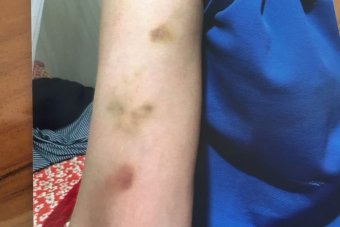Family's battle for justice for daughter who sustained unexplained black eyes, cuts in care
Updated
Cattle farmer John Barnett said his family had the worst year of their lives in 2016.
Key points:
- Jane Barnett was allegedly physically assaulted three times while living in a group home
- On one occasion she was allegedly punched in the eye after objecting to an interruption to her routine
- Her father is pushing for security cameras in care homes
Not only was his intellectually disabled daughter Jane allegedly physically assaulted three times while living in a group home but he lost his wife of four decades to a heart condition that he attributes to the resulting stress.
It was the tragic end to an 18-month saga that began when Jane left the family farm for a group home located on the NSW mid-north coast.
At first Jane, 35, seemed settled in her new home, until she started arriving home for visits with unexplained bruises.
At first it was two black eyes, then it was another black eye, then it was a series of bruises on her upper arm.
Jane has cerebral palsy, an intellectual disability and a condition called dyspraxia, which means she cannot speak.
Over the years she has developed her own unique sign language that she uses to communicate with her family and friends.
Mr Barnett said after the second black eye they went to police.
"My wife asked Jane what had happened so over a period of time she worked out who it was and how it happened," Mr Barnett said.
The story that emerged was that a support worker had broken Jane's typical daily routine.
Jane had objected and it was then that she was allegedly punched in the eye.
"The problem was there was no witnesses to it," Mr Barnett said.
He said the local police were helpful.
"They actually referred it to a magistrate in Coffs Harbour and he said, 'Well, we can put her on the stand it's going to cause her a lot of drama and at the end of it it will be her word against the support workers word'.
"So we elected not to pursue it because it was only going to aggravate the situation for Jane."
'Because you're disabled you won't be believed'
But this was only the beginning for the Barnetts.
"Within three weeks another injury happened to her where she had bruising on her right arm in the shape of a big hand and a scratch on her chin," Mr Barnett said.
"So again [Jane] relayed to her mother that one of the workers had grabbed her by the arm and shaken her head."
However this time Mr Barnett said the police were less helpful.
"So it kept coming back to the fact that because you're disabled you won't be believed," he said.
Since then the workers allegedly involved have left the home. One still works in the sector.
No-one has ever been charged.
Mr Barnett was also critical of the role of both the Government and NSW Ombudsman in the process.
He said "independent" investigators were hired by and paid for by the State Government.
His wife Christine collapsed on their family farm in January last year while Jane was visiting.
Jane looked on as he tried to resuscitate her mother but Christine was never revived.
"It hasn't been easy the stress it caused my wife, a lot of people believe it attributed to her early death," he said.
"So it hasn't been good."
Security cameras will answer questions: father
Mr Barnett said Jane had always been very consistent when relaying what happened to her with department investigators.
"She has nothing to gain from telling lies because of her intellectual disability," he said.
However he has conceded he will never really know what happened to his daughter and that was why he was calling for security cameras in all group homes.
"You're not allowed to have CCTV cameras because it impinges on someone's personal liberties," he said.
"But my response is, is a sexual assault or a physical assault more of an infringement of the liberty than a CCTV camera?
"You're not providing for these people who cannot speak for themselves."
NSW Minister for Disability Services, Ray Williams, said privacy was a real concern.
However he said he would consider any proposal for reforms put forward by the department or regulators.
"At this point in time I'm satisfied the appropriate laws are in place satisfy the needs of people with disability," he said.
"There are increased safeguards that we've put in place as a government."
A spokeswoman for Federal Attorney-General George Brandis said the Government was looking at national justice strategies but criminal law was a matter for each state.
"The Government is working co-operatively where possible, and within its jurisdiction, to improve the lives of people with disability in the justice system."
Mrs Barnett's death was caused by an inflammation of the heart wall, most likely brought on by a virus.
She was aged 60.
Topics: health, disabilities, law-crime-and-justice, community-and-society, carers, australia, nsw, kempsey-2440
First posted











